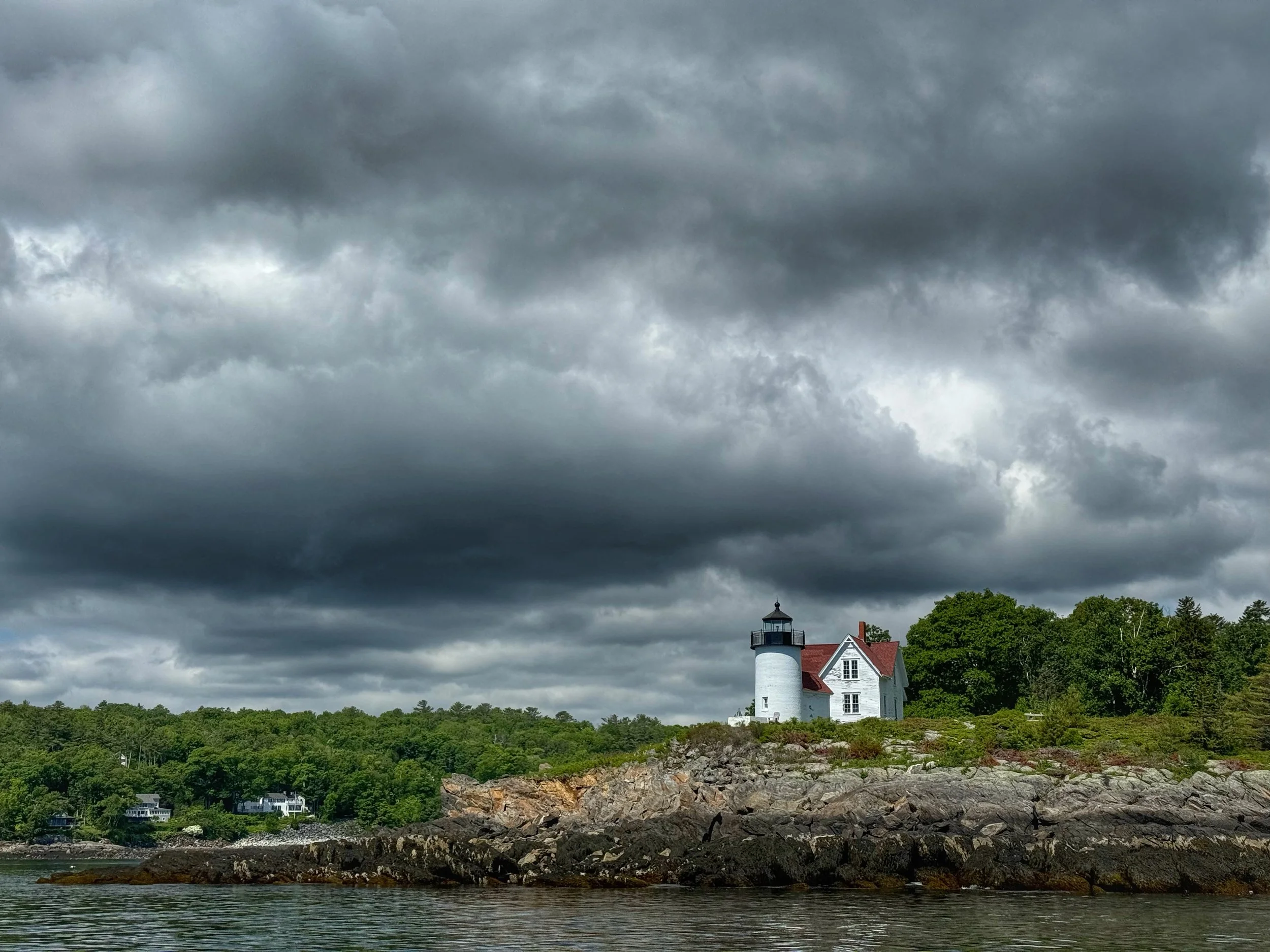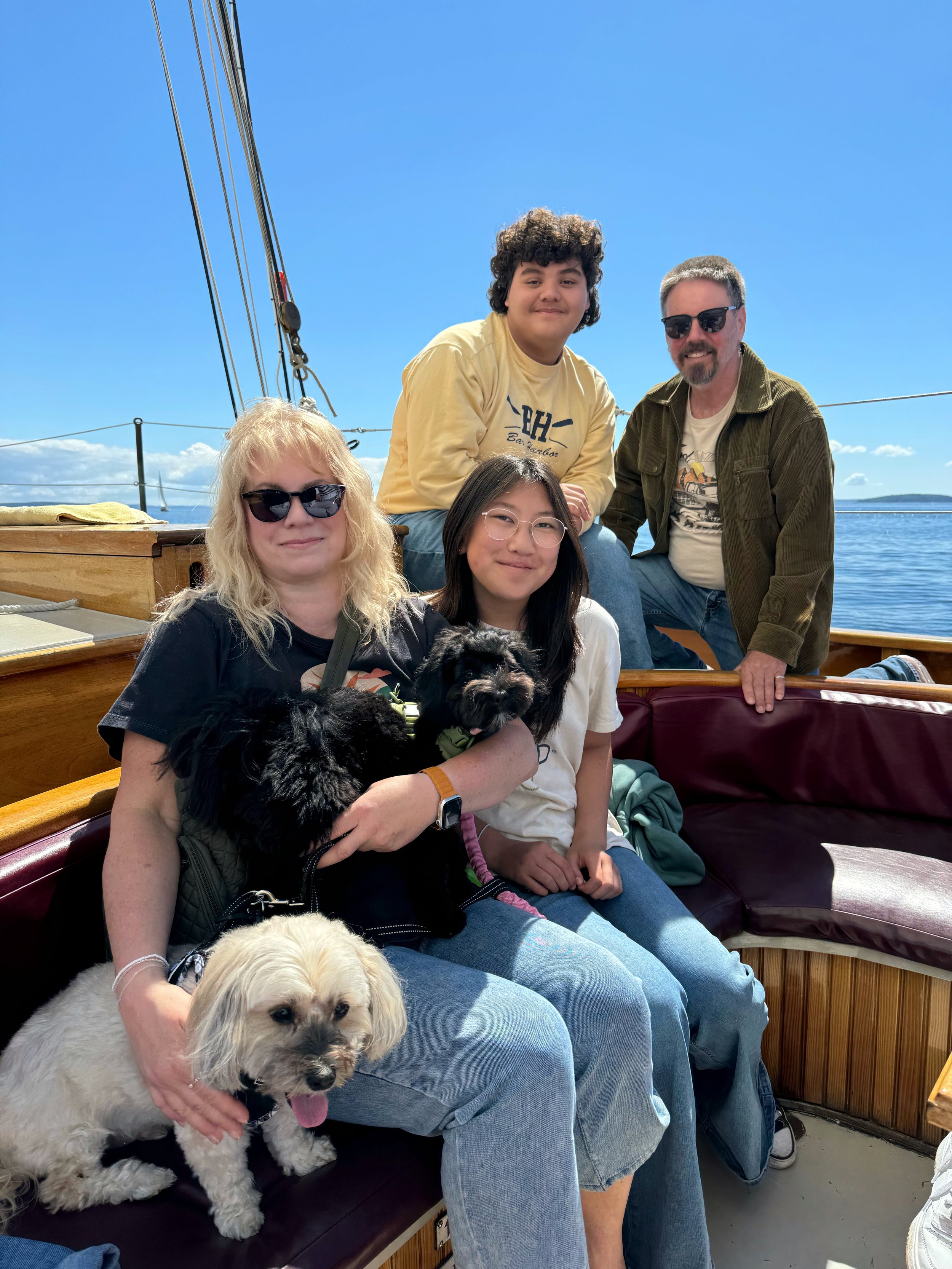Road Trips and Audiobooks: A Journey of Healing from Medical PTSD
Approximate read time - 7 minutes
I snapped this shot of Curtis Island on a cruise around Camden Harbor in Maine—the town where Ted and I lived 25 years ago.
We finally took a long-awaited vacation to the coast of Maine. Our last vacation was in October 2021–one month before Ted came down with the deadly strain of COVID-19. We had car trouble, not once but twice, and we joked that we needed a vacation from our vacation. This trip was long overdue.
I did the typical things one does to prepare for a road trip—gathered snacks, stocked the first aid kit, checked reservations, and collected everything I thought we might need for a family of four and two dogs.
Special memories made on a schooner named Olad!
The weather was perfect for a sail around Camden Harbor, Maine. We had no clue how our fur babies would do, but they were regular sea dogs!
An audiobook made the list of must-haves. The chosen book, a medical/survival story, was a bold choice for me—and I knew it. But it was time I started reading books in my genre—the same Survival-Medical-Inspirational-memoir genre in which I'm publishing my own book. It was no new news to me that I probably should've read these books before I wrote my own, but that wasn't possible then.
In the past, I never dared to even glance at the book blurb if there was a clue the content was medical related. The thought made my mind go wild with worry, creating a tingling heat that started at my neck and down my arms, to my core and finally settled in my knees, making keeping my balance challenging. I didn't dare whisper a word of my kryptonite to anyone, fearing I'd have to explain.
This was why picking "Between Two Kingdoms—A Memoir of Life Interrupted" by Suleika Jaouad was a very daring selection. It's the story of a young 20-something girl who was diagnosed with acute myeloid leukemia just as life was about to begin. The first half entailed fighting for her life, and the second half was finding herself in the aftermath.
Throughout our trip, I had my AirPods ready, waiting to twist into my ears and listen. Instead, I chose to look at the scenery as we drove six hours to our first stop and then another six hours to our next destination. After seven days of traveling, I didn't listen to anything, which I promise is not typical for me. I reasoned that maybe I just wanted to soak in my surroundings. I thought maybe I just needed to appreciate every inch of this trip. It was all true, but I knew there was something else.
During Ted's illness, I didn't have a choice—I was immersed in the medical world. Every day, I watched Ted struggle to live, and I imagine the internal torture he endured. Every day, whether I wanted to or not, I was taught something new—about medicine, the workings of a machine, the reasons the ventilator beeped incessantly, and how the medical providers were just people like me. The combination was the start of my desensitization to my medical trauma, but I didn't know it yet.
“The paradox of trauma is that it has both the power to destroy and the power to transform and resurrect.”
When Ted finally arrived home from the hospital, I spent almost every morning seated on our back porch, clacking away on my keyboard, writing what I remembered. It was terrifying to relive. My mind was exhausted from processing my father's death while watching my husband's body deteriorate for months, not knowing if I'd be a widow and single parent. Even though it was Ted's body that suffered, it was my mind that captured it all.
It was only after months of therapy that I finally whispered my fears to my therapist, Anna, admitting I hadn't seen a doctor in years. How many years, she asked. "Um, maybe ten years?" I replied, turning my head, not wanting to see her expression. She kept her cool and showed no display of shock, only compassion. Even though I was safe during the hour-long conversation, it still put me in all-too-familiar panic mode.
I was later diagnosed with Medical cPTSD—the "c" stands for complex, which means it developed after experiencing prolonged or chronic trauma. The PTSD wasn't from one single event, but many. The diagnoses started to make sense.
I gradually gained the courage to tell my story of being put on bed rest, rushed to the ER multiple times, and finally losing our baby, as well as being presented with the grime news of my breast cancer diagnosis, which was delivered as if I was terminal—only six weeks later discovering it was stage 0, by then the damage and fear entwined into my already fragile psyche.
Thankfully, Anna knew what she was doing and slowly and carefully helped me sort through my bottomless, dark pit of medical terror. We left no stone unturned. Witnessing her reaction to some of my experiences was surprisingly comforting—because it made me realize things were just as bad as I thought—it wasn't all in my head.
Writing my experiences was so therapeutic—I expected that. But I wasn’t prepared how liberating and cathartic it would be to say it out loud—to hear the words for myself. Slowly, those fears that froze me in my tracks started to lose their power.
One baby step at a time, Anna helped me dip my toes into increasing my self-care, which included finding a primary care physician. Anna knew someone who would be the perfect fit, and fortunately, he accepted me as a patient.
My new doctor, Dr. J, was kind, thorough, unbelievably compassionate, and understanding of my situation. He was prepared for this to be a journey, a marathon, and not a sprint. He explained that everything was in my control and that I could say "no" to anything he suggested. I left that doctor's office, radiating with relief that I had taken my first step.
I'm learning that complex PTSD doesn't just leave once you discover you have it, but with therapy and allowing space for self-compassion, it's possible to not fall into the trap of those dreaded triggers that lurk around the corner. In the past, I would spiral, sometimes for days, if someone mentioned the "c" word or spoke about losing a child. Even walking through a grocery store could set off my bionic ears, and I'd catch words of an illness, a birth, a death—I had to be hyper-vigilant. I had to be prepared. How else could I brace myself for whatever came next?
Fast forward to now, and I've been to multiple doctor's visits, seen specialists, and even had surgery behind me. When Anna and Dr. J beam with pride and tell me how far I've come and how proud they are of my progress, I blush but don't hold back—I agree wholeheartedly with them. I'm proud of myself, too.
Now, I'm equipped with tools and work hard to keep facing forward, toward the future, but at the same time, not to look past the next step. It's a balancing act some days. But still, I didn't want to push it, not on this vacation that we desperately needed. What if something in the book triggers me and unravels all my hard work? It felt like a test.
Somewhere during the trip, I forgot all about it, and as we traveled the many hours home, it was my turn to drive. The warm summer sun showed through the windows, and the gentle sway of the vehicle rocked everyone asleep. I popped in my AirPods and played the waiting audiobook.
I listened to Suleika, the author, carefully narrate her book, perfectly annunciating the words of her own story and sharing the deepest, most intimate parts of her life. I felt her fear like it was my own, but instead of triggering me, I felt a camaraderie with her. Our stories could not have been more different, but I identified with every emotion and reaction.
“There is something called Post-Traumatic growth, a theory that explains a kind of positive outcome or transformation following trauma.”
Listening to Suleika's journey, I felt a profound connection and realized that sharing our stories—no matter how painful—can be a source of immense healing and growth that would not have happened otherwise. The last two years taught me something crucial: the past doesn't define us, but our courage to confront it does.
If you've ever faced medical anxiety or any form of trauma, I invite you to take a moment today and reflect on your journey. Consider writing down one thing you've learned about yourself through your experiences. This small act of acknowledgment can be incredibly powerful and a first step towards healing.
I also encourage you to share your story with someone you trust or even in the comments below. Let's create a safe space where we can support each other. Remember, you are not alone. By sharing our experiences, we can lift each other up and find strength in our collective resilience.
Your story matters.
Love,
Michelle







